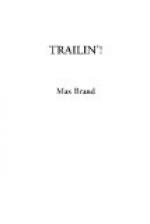The mouth of Jansen stirred, but no words came. A hopeless yearning was in his eyes. But he dropped the cigarette and ground it under his heel.
“I thought,” growled Lawlor, “that you knew your master, but don’t make no mistake again. Speakin’ personal, I don’t think no more of knockin’ down a Swede than I do of flickin’ the ashes off’n a cigar.”
He indulged in a side glance at Bard to see if the latter were properly impressed, but Anthony was staring blankly straight before him, unable, to all appearances, to see anything of what was happening.
“Kilrain,” went on Lawlor, “trot out some cigars. You know where they’re kept.”
Kilrain falling to the temptation, asked: “Where’s the key to the cabinet?”
For Drew kept his tobacco in a small cabinet, locked because of long experience with tobacco-loving employees. Lawlor started to speak, checked himself, fumbled through his pockets, and then roared: “Smash the door open. I misplaced the key.”
No semblance of a smile altered the faces of the cowpunchers around the table, but glances of vague meaning were interchanged. Kilrain reappeared almost at once, bearing a large box of cigars under each arm.
“The eats bein’ over,” announced Lawlor, “we can now light up. Open them boxes, Shorty. Am I goin’ to work on you the rest of my life teachin’ you how to serve cigars?”
Kilrain sighed deeply, but obeyed, presenting the open boxes in turn to Bard, who thanked him, and to Lawlor, who bit off the end of his smoke continued: “A match, Kilrain.”
And he waited, swelling with pleasure, his eyes fixed upon space. Kilrain lighted a match and held it for the two in turn. Two rows of waiting, expectant eyes were turned from the whole length, of the table, toward the cigars.
“Shall I pass on the cigars?” suggested Bard.
“These smokes?” breathed Lawlor. “Waste ’em on common hands? Partner, you ain’t serious, are you?”
A breath like the faint sighing of wind reached them; the cowpunchers were resigned, and started now to roll their Durham. But it seemed as if a chuckle came from above; it was only some sound in the gasoline lamp, a big fixture which hung suspended by a slender chain from the centre of the ceiling and immediately above the table.
“Civilizin’ cowpunchers,” went on Lawlor, tilting back in his chair and bracing his feet against the edge of the table, “civilizin’ cowpunchers is worse’n breakin’ mustangs. They’s some that say it can’t be done. But look at this crew. Do they look like rough uns?”
A stir had passed among the cowpunchers and solemn stares of hate transfixed Lawlor, but he went on: “I’m askin’ you, do these look rough?”
“I should say,” answered Bard courteously, “that you have a pretty experienced lot of cattle-men.”




